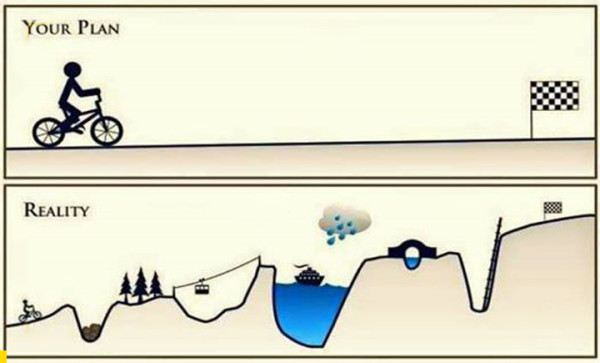
An older worker is considered anyone in their 40s and above. Although it’s not a guarantee, as we get older, there’s potential to find that age may be a hindrance to landing the job we want or moving up the corporate ladder in the job we have. A 2017 survey by the AARP found that almost two thirds of workers age 55-64 feel their age is a barrier to getting a job. Although it seems that more law suits are brought up in the work realm over gender or race discrimination, age bias is still an important topic any mature worker should be mindful of each time they’re in a job search. But before I dive into a checklist of helpful tips, let’s look at why and how discrimination happens and what the law says.
WHAT THE LAW SAYS
The Age Discrimination in Employment Act of 1967 (ADEA) states that, “…it is unlawful to discriminate against a person because of his/her age with respect to any term, condition, or privilege of employment, including hiring, firing, promotion, layoff, compensation, benefits, job assignments, and training.” This applies to companies with 20+ employees and their job postings, pre-employment inquiries, apprenticeships, and benefits. The ADEA also makes it illegal to retaliate against someone who opposes or files a charge against discriminatory employment practices, testifies to such, and/or is involved in the investigation/litigation process in such a case.
WHY WOULD A HIRING MANAGER BE AGE-BIASED?
Well, with the ADEA in place we’re safe, right? Not necessarily, which I’ll go into shortly. So what would make an employer discriminate against an older worker?
- They’re concerned an older worker may not be as up on their technical skills/training, current events, technology, and/or industry trends. In many places, there’s a perception that older workers may not have the tech savvy that younger ones possess.
- Some could assume that an older worker will want a large salary and thus feel like they can hire in someone younger for a lower salary.
- They might feel an older worker may not fit in with the current staff, particularly in small startup companies or those with a primarily young team.
- Other assumptions still persist such as, “Older workers get exhausted by their work or neglect their health,” or that mature job seekers are looking to coast toward retirement.
- Some hiring managers may have an idea of what the “best” employee age is for a team, and some may straight up think you are too old for the job.
- Not all companies have implemented such initiatives as bias awareness training and employment auditing and/or rid their applications of identifying characteristic questions.
HOW ARE THEY GETTING AWAY WITH IT?
If bias—unconscious or not—is happening in the hiring process, how, you may ask, are companies getting away with it?
Some employers’ online applications contain questions (such as graduation dates) that can lead to age bias. Some go so far as to ask for an applicant’s date of birth, which is illegal at this stage of the candidate soliciting process.
If pushed when an applicant follows up (or if ever brought up in court), a hiring manager could use excuses like, “You’re overqualified,” “We don’t think you’d be happy…,” or “You won’t be a good fit for our team,” when the underlying decision was in reality age-biased.
Unfortunately for applicants, workers already on the job are in a better position (and probably more likely) to bring up a complaint about age discrimination vs. someone who’s job hunting. So let’s look at several things you can do to increase your chances of securing rewarding fairly compensated work.
SIDEBAR: How do say, bars, clubs, or Abercrombie stores get away with picking and choosing the young attractive applicants? They are most likely getting away with this by saying they need to hire workers that can help the company relate and appeal to their target customers—or that younger folks may work for the pay they can offer moreso than older candidates.
WHAT YOU CAN DO
A.) The Application
The most crucial place age discrimination could come in, since the hiring manager will see you in person during a webcam or personal interview, is the application process. Do your best to omit dates of graduation and military service, and don’t list your birthday.
For companies who have a mandatory date blank for degrees earned, if possible, enter “9999” there in order to satisfy that field and move on. When there’s something you don’t feel comfortable answering on an application, try entering “flexible” or “will discuss” as the field allows.
B.) Your Resume & LinkedIn Profile
- Omit the dates mentioned above in the previous section.
- In order to show you’re involved beyond your time at work and on top of industry trends, you could list any professional associations, meet up or networking groups, and industry groups in which you’re involved.
- Avoid statements like 25+ years of experience, and just say, “more than 10 (or 15) years of experience…”
- Exclude all clues to your age in the syntax of the email address you use (e.g., janesmith1962@aol.com) or your website (www.bobjones1975.com/resume.html).
- Omit any obsolete software with which you worked. Instead, be sure to include any current critical software you’ve learned that pertains to the job at hand. Definitely include any relevant new skills and recent training you’ve completed.
- Don’t list or give references until asked, and of course, make sure the contact info for your references is up to date. If you feel like you might get the job, be sure to send them a quick text or email letting them know to expect a call and what the job is so they can be a little more ready to speak to your qualifications.
- Freshen up the formatting of your resume. Make sure there’s some white space, and feel free to punctuate certain sections with some color or underlining. Try another professional font, like Calibri. Include either your last 10 years of work history or your last 3 jobs. If you have a varied job history, use a functional or combination instead of a chronological style resume, and reference your latest 3 or 4 jobs that mirror the requirements of the one for which you’re applying.
- If needed, find a good photographer experienced with taking headshots. With a flattering hair style, sharp clothing, and the right lighting and background anyone can look up to date and professional. Use the new photo at your LinkedIn profile.
C.) Your Skills
Whether you’re competing with someone in their 20s or 50s, you need to be on top of keeping your skills current and competitive. Stay in the know on trends in your industry and current events—especially those relevant to your field. Have an online presence. If you feel like there’s training you need or software you should learn, seek out a source. If you’re employed, start by asking your supervisor. Who knows; maybe the company will cover the cost of the training or allow you to train during work hours!
D.) The Company/The Interview
Age discrimination can also factor into the interviewing process as well as the final decision. If you’ve typically or recently worked in a large company, you could seek out smaller or growing businesses where your experience will be needed and valued. You can use seniorjobbank.org, aarp.org/work, retirementjobs.com/search, grandparents.com/money-and-work/career/jobs-people-over-50, and retirementliving.com/retirement-jobs to research companies that are older-applicant friendly.
Don’t go too far and dye your hair jet black. And if the style of dress is casual, don’t show up to the interview in a 3-piece suit. Find a fashion savvy friend you trust to give you a few pointers on your wardrobe, hair, etc. with the goal of being able to compete with the sharpness of younger applicants while still maintaining the authenticity of who you are. Go contemporary and professional while being age appropriate.
As you interact with the interviewer, show energy, enthusiasm, and your knowledge of the industry and the company. If you feel your age may be an issue, be proactive and mention the skills and experience you bring to the job and that you’re willing to put in extra hours as needed. Talk about a time when you brought a team together when things got tough and/or stress that you’ll use your skills to help the company maintain and increase profits.
E.) Other Tips
Networking – Mature workers should have a large network of contacts. Start there, and draw upon those you know as you begin your job search. These folks know you and have a sense of how you are as a person (and most likely what kind of employee you are), and may be able to get your foot in the door at their company or one where they have a colleague. Some companies’ HR departments are in the “hire younger/inexperienced workers at a lower pay rate” mindset and may be searching in that manner. Networking may help you bypass typical HR screening.
Career shift – Some job seekers may want or need to move in the direction of creating their own job or business, which could be partly linked to their career path, interests, or network. You could offer to work on a consulting or project basis for companies on your target list—or present on topics.
Physical fitness – Get and stay in the best physical shape you can. Come up with a fitness routine; at a minimum, try to walk for 30 minutes 4 times a week. Allow yourself some relax and de-stress time, reading, watching some TV, and spending time with friends and family.
HOPE
Keep at your job search. Even if you feel your age has been a hindrance, slowing down or letting a bummed out attitude take over won’t help you.
The statistics show that employers are softening on skewing toward a preference for younger workers. In October of 2016, the National Council on Aging (NCOA) found that by 2019 it’s projected that over 40% of Americans age 55+ will be employed, making up over 25% of the US labor force.
This is up from 13% in 2000 and 22.2% in July 2014! Further, a study by London Business School researchers found most negative assumptions about older workers to be untrue.
Employers rate mature workers high on characteristics such as punctuality, judgment, attention to quality, and attendance. Mature workers may stay on the job longer than millennials and be more focused. Research shows that Americans age 55 and up adapt to new technology successfully, take fewer sick days, and are more loyal than 30-something aged employees.
With older employees, a company has the benefit of their wisdom and can utilize them as a mentorship resource. They’re also quite a value: Employers can hire someone with a wealth of knowledge at the budget they have since many older workers are not trying to continue to climb the corporate ladder like someone in their 30s or increase their salary with each successive position.
Wherever you are in your job search, if you really need an extra dose of hope, purpose, and encouragement, check out the Epilogue in my book Here Today, Hired Tomorrow.
So while it may feel like aging is a detriment to your career in your later years, know that there are many things you can do to get the job you want and vie for moving up. Older employees who keep their knowledge and skills current and know how to present themselves are not only valuable but putting themselves in the best position to give the competition a run for their money—and youth!
Additional info from AARP Magazine 2018: “3 in 5 older workers have seen or experienced age discrimination in the workplace. 1 in 4 have been subjected to negative comments about their age from a supervisor or coworker. 44% of older workers who’d applied for a job recently were asked for birth date or other age-related info, and 91% of older workers surveyed support strengthening US age discrimination law. –from “The Value of Experience: Age Discrimination Against Older Workers Persists.” Download the report.
Resources for Mature Job Seekers:
• Learn more about AARP’s fight against age discrimination, plus tips for navigating age in your job search & at work.
• AARP’s Work Reimagined site – is a great place for older workers looking to change work paths.
• Email AARP if you think an employer is discriminating against older workers.
• AARP Job Board – includes FT, PT, telework & flex job opportunities.
• Fifty Forward
• NCOA
Sources:
• Thanks to Guin Tyus and Clay Faircloth at the Nashville Career Advancement Center.
• American Job Center’s “Helpful Hints for the Mature Job Seeker” workshop participant guide; www.ncacworkforce.org
• https://en.wikipedia.org/wiki/Employment_discrimination_law_in_the_United_States
• https://www.seattletimes.com/nwshowcase/careers/the-middle-aged-resume-what-to-leave-in-what-to-leave-out
• https://www.kiplinger.com/article/retirement/T012-C000-S004-battling-age-bias-when-job-hunting.html
• https://www.huffingtonpost.com/entry/age-discrimination-five-ways-older-workers-can-overcome_us_5934cd36e4b062a6ac0ad13f
• http://www.precisionstaffing.net/2017/10/13/biased-not-avoiding-bias-hiring-process
• https://www.huffingtonpost.com/entry/age-discrimination-five-ways-older-workers-can-overcome_us_5934cd36e4b062a6ac0ad13f
• http://college.monster.com/training/articles/1415-hr-says-is-this-interview-question-legal
Have you ever encountered age discrimination in your search or at your job, and if so what did you do about it? Comment in the “Start the Discussion” blank below.
Looking for a new job? Want to get what you want fast? Check out my book, Here Today, Hired Tomorrow (kurtkirton.com/hthtbook), and subscribe to my blog (kurtkirton.com) for free advice on your job search.

